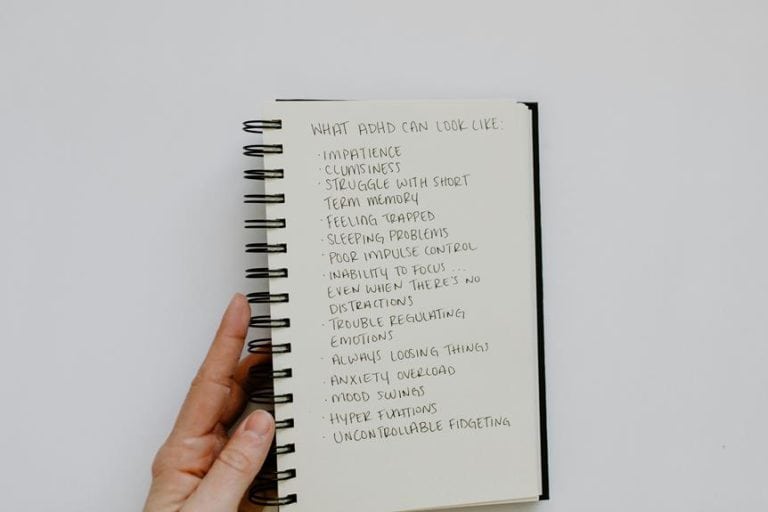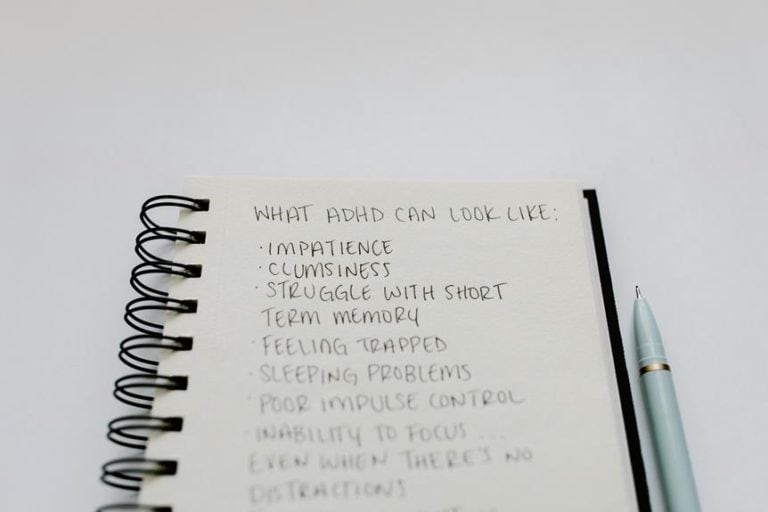Adhd Shame Spiral
Traversing the complexities of ADHD can feel like wandering through a maze where every turn leads to a different emotion. The constant struggle between hyperfocus and distraction can sometimes send me spiraling into a whirlpool of shame and doubt.
But what if there's a way to break free from this cycle? Join me as we explore the depths of the ADHD Shame Spiral and uncover strategies to empower ourselves towards self-compassion and acceptance.
Key Takeaways
- Intense shame from mistakes and failures
- Strategies to break the shame cycle
- Importance of self-compassion and support
- Self-care practices and seeking help for managing shame
Understanding the ADHD Shame Spiral

In my experience, understanding the ADHD shame spiral involves acknowledging the intense emotional impact of mistakes or failures on individuals with ADHD. Shame, a powerful emotion, can engulf those with ADHD when they perceive their actions as falling short of expectations. This shame spiral can lead to a cascade of negative feelings, triggering self-doubt, anxiety, and a deep sense of worthlessness. The unique challenges that individuals with ADHD face, such as impulsivity and difficulties with executive functioning, can exacerbate these feelings of shame.
Cruising the ADHD shame spiral requires a vital approach towards oneself. Self-compassion plays a critical role in breaking free from the grip of shame. By practicing self-compassion, individuals can learn to challenge the negative thoughts that fuel the shame spiral. Cultivating mindfulness and seeking support from others can also aid in managing and preventing shame spirals. Understanding the nuances of shame in the context of ADHD is essential in developing effective coping strategies and fostering a sense of self-acceptance.
Triggers of Shame Spirals

Failure, rejection, uncertainty, and procrastination are common triggers that can set off a shame spiral for individuals with ADHD. These experiences can be overwhelming and feed into feelings of inadequacy and self-blame, intensifying the shame cycle.
Understanding these triggers and learning how to break the cycle is essential in managing the impact of shame on individuals with ADHD.
Causes of Shame
Experiencing perceived rejection can often act as a potent trigger for shame spirals in individuals with ADHD. The causes of shame in individuals with ADHD can be multifaceted, stemming from various triggers that exacerbate feelings of inadequacy and self-doubt.
Some key factors that contribute to the shame experienced by individuals with ADHD include:
- Failure: Even minor setbacks or perceived failures can lead to intense feelings of shame in individuals with ADHD.
- Rejection Sensitivity: Rejection sensitivity dysphoria can amplify feelings of rejection and shame in those with ADHD.
- Procrastination: Delaying tasks can result in a sense of failure and contribute to the shame spiral experienced by individuals with ADHD.
Breaking the Cycle
Perceived rejection and feelings of inadequacy often set the stage for the shame spiral experienced by individuals with ADHD.
The triggers of shame spirals in ADHD individuals, such as rejection sensitivity, emotional distress, uncertainty, and procrastination, can noticeably impact their self-esteem and well-being.
Rejection sensitivity dysphoria, a common experience in ADHD, intensifies the feelings of shame and worthlessness, further perpetuating the negative cycle.
Uncertainty in new situations can lead to heightened self-doubt and anxiety, exacerbating the shame spiral. Additionally, procrastination often results in overwhelming tasks and a sense of failure, adding fuel to the cycle of shame.
To break this detrimental pattern, individuals with ADHD may benefit from strategies that address rejection sensitivity, emotional distress, and procrastination, fostering a healthier mindset and coping mechanisms.
Impact on Individuals With ADHD

Individuals with ADHD frequently grapple with shame spirals, which stem from rejection sensitivity and negative self-perceptions. The impact of these shame spirals on individuals with ADHD can be profound and debilitating, manifesting in various ways:
- Social Withdrawal: Shame spirals often lead individuals with ADHD to isolate themselves from social interactions, fearing further rejection or judgment.
- Depression: The constant negative self-perceptions and feelings of inadequacy can spiral into depression, affecting the individual's overall mental well-being.
- Worthlessness: The relentless cycle of shame can make individuals with ADHD feel unworthy, undeserving, and incapable, further perpetuating the spiral of negative emotions.
Coping through these challenges requires a combination of professional guidance and self-compassion. By acknowledging these struggles and seeking appropriate support, individuals with ADHD can gradually break free from the destructive cycle of shame spirals and work towards healthier mental and emotional well-being.
Breaking the Shame Spiral Cycle

Breaking the shame spiral cycle begins with recognizing triggers and patterns that fuel negative thoughts.
By practicing self-compassion daily, one can start shifting from a place of self-blame to understanding and kindness towards oneself.
Seeking professional support can also provide valuable strategies and guidance in breaking free from the cycle of shame.
Recognizing Triggers and Patterns
Recognizing the triggers and patterns in the ADHD shame spiral is important for effectively breaking the cycle of negative emotions and self-perception. Failure, rejection sensitivity, uncertainty, and procrastination often act as catalysts for spiraling into feelings of worthlessness, self-doubt, anxiety, and depression.
To address these triggers and patterns, it's vital to:
- Acknowledge the impact of failure and rejection sensitivity on self-esteem.
- Identify how uncertainty and procrastination contribute to the cycle of shame.
- Develop personalized coping strategies to manage these triggers and interrupt the negative patterns.
Understanding these elements can empower individuals to regain control over their emotions and thoughts, paving the way towards a healthier self-perception and improved well-being.
Practicing Self-Compassion Daily
Engaging in daily self-compassion practices is a transformative strategy for disrupting the cycle of the ADHD shame spiral. By actively engaging in self-affirming activities like journaling or meditation, individuals can combat negative self-talk and promote emotional healing.
Recognizing and challenging critical thoughts with self-compassion not only helps in breaking the shame spiral cycle but also fosters resilience. Cultivating a positive inner dialogue through self-compassion is essential in reducing the impact of shame on productivity and mental well-being.
Consistent self-compassion routines empower individuals to navigate shame triggers effectively, leading to the development of self-acceptance and a healthier mindset. Through these practices, individuals can build emotional resilience and create a more positive relationship with themselves, ultimately breaking free from the destructive patterns of shame spirals.
Seeking Professional Support
Seeking professional support is a proactive step individuals can take to effectively break the cycle of the ADHD shame spiral and work towards emotional well-being. Professional help, such as therapy or executive function coaching, can provide vital guidance and skills development to overcome challenges related to shame spiraling. Here are three key benefits of seeking professional support in managing ADHD and addressing the shame spiral:
- Therapy and coaching offer strategies to break destructive cycles and manage shame effectively.
- Professional intervention can assist in identifying and addressing underlying mental health issues contributing to shame.
- With proper support, individuals can work towards breaking free from the shame spiral cycle and achieve improved emotional well-being.
Strategies for Self-Compassion

To cultivate self-compassion, it's important to embrace one's mistakes without harsh self-criticism. Individuals with ADHD often find themselves caught in a shame spiral, where self-criticism feeds into feelings of inadequacy. Breaking free from this spiral involves recognizing personal worth and understanding that mistakes are a natural part of the learning process. Self-compassion allows for kindness towards oneself, fostering a more positive outlook.
Connecting with supportive individuals can greatly aid in developing self-compassion. Sharing experiences with those who understand and offer empathy can help alleviate feelings of isolation and self-doubt. Seeking professional help is also beneficial, as therapists can provide tools and strategies tailored to individual needs.
Engaging in self-care practices is another essential aspect of fostering self-compassion. Creating a calm environment, practicing mindfulness, engaging in activities that bring joy, and spending time in nature can all contribute to a sense of well-being and self-acceptance. By incorporating these strategies into daily life, individuals with ADHD can nurture a more compassionate relationship with themselves.
Seeking Support and Help

Support and guidance from understanding individuals or professionals can be instrumental in breaking free from the shame spiral associated with ADHD. Seeking support is a critical step in maneuvering the challenges of ADHD and overcoming feelings of shame and self-criticism. Here are three key points to ponder when seeking help:
- Professional Help: Therapy or executive function coaching can provide valuable guidance and strategies to combat the shame spiral effectively.
- Support Network: Building a support system of understanding friends, family, or support groups can offer empathy, encouragement, and a sense of belonging during difficult times.
- Coping Strategies: Developing personalized coping strategies and self-care routines is essential for managing shame and negative emotions, promoting self-compassion and emotional well-being.
Recognizing the need for support and reaching out for help are courageous steps towards breaking free from the grip of shame and building a more compassionate relationship with oneself.
Empowering Yourself to Overcome Shame

Managing the challenges of ADHD can be an intimidating journey, especially when confronted with the suffocating grip of shame spirals. These spirals can lead to feelings of worthlessness, self-doubt, and anxiety, hindering our ability to thrive. To empower ourselves and break free from this destructive pattern, it's important to acknowledge our strengths and successes. By shifting our focus from negative self-talk to self-compassion, we can begin to unravel the shame spiral.
Connecting with supportive individuals and groups plays an essential role in combatting shame and fostering self-compassion. Surrounding ourselves with understanding and empathetic people creates a safe space to challenge our negative beliefs. Additionally, creating a calm environment through activities like spending time in nature and practicing meditation can help cultivate self-acceptance.
Seeking professional help, such as therapy or coaching, equips us with the necessary skills and strategies to effectively overcome shame spirals. Through a combination of self-reflection, self-compassion, and external support, we can empower ourselves to navigate the challenges of ADHD with resilience and confidence.
Frequently Asked Questions
What Is the Shame Cycle for Adhd?
I manage the shame cycle by using coping strategies, seeking support systems, practicing self-compassion, prioritizing mental health, and endeavoring to reduce stigma. These actions help me break free from negative thoughts and embrace self-acceptance.
How Do You Get Out of ADHD Shame Spiral?
When I navigate the ADHD shame spiral, coping strategies, self-compassion, support systems, mindfulness techniques, and cognitive reframing are my tools. By embracing these practices, I overcome challenges, learn, and grow with resilience.
What Is the ADHD Relationship Spiral?
The ADHD Relationship Spiral involves communication breakdowns, emotional triggers, and challenges with relationship repair. Coping strategies like self-compassion practices are key. Recognizing these patterns and seeking support can help navigate the complexities of social interactions.
Why Is Life Harder With Adhd?
Life with ADHD is challenging due to daily struggles with cognitive overload, impulse control, time management, and social interactions. These difficulties can create a sense of constant pressure and frustration, making everyday tasks more demanding.
Conclusion
To sum up, the ADHD Shame Spiral can have a profound impact on individuals with ADHD, leading to feelings of worthlessness and self-doubt. It's important to recognize the triggers of shame spirals and develop coping strategies to break free from this cycle.
One interesting statistic to take into account is that 70% of adults with ADHD report experiencing feelings of shame and guilt related to their symptoms. By seeking support and practicing self-compassion, individuals can empower themselves to overcome shame and cultivate a positive self-image.







